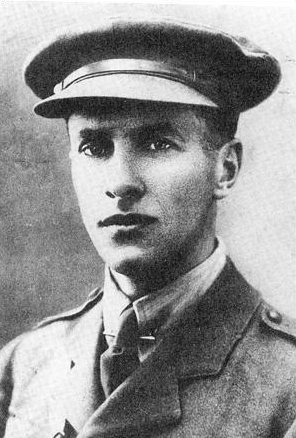
Walter Duranty
Walter Duranty (25 May 1884 – 3 October 1957) was an Anglo-American journalist who served as Moscow bureau chief of The New York Times for fourteen years (1922–1936) following the Bolshevik victory in the Russian Civil War (1917–1923).
Walter Duranty
In 1932, Duranty received a Pulitzer Prize for a series of reports about the Soviet Union, eleven of which were published in June 1931. He was later criticized for his subsequent denial of the widespread famine (1930–1933) in the USSR,[1] most particularly the Holodomor. Beginning in 1990, there were calls for the Pulitzer board to revoke Duranty's prize. The Pulitzer Board declined to revoke the award and in 2003 said the articles which it examined in making the award did not contain "clear and convincing evidence of deliberate deception".[2]
$_$_$DEEZ_NUTS#0__titleDEEZ_NUTS$_$_$
$_$_$DEEZ_NUTS#0__subtitleDEEZ_NUTS$_$_$
Early life and career[edit]
Duranty was born in a middle-class Merseyside family to Emmeline (née Hutchins) and William Steel Duranty. His grandparents had moved to Birkenhead, on the Wirral Peninsula in Cheshire, from the West Indies in 1842 and established a successful merchant business in which his father worked. He studied at Harrow, one of Britain's most prestigious public schools, but a sudden collapse in the family business led to a transfer to Bedford School. Nevertheless, he gained a scholarship to study at Emmanuel College, Cambridge, where he graduated with a first-class degree.[3]
After completing his education, Duranty moved to Paris, where he met Aleister Crowley and participated in magic rituals with him. Duranty became involved in a relationship with Crowley's mistress, Jane Cheron, and eventually married her.[4]
In Magick Without Tears, Crowley terms Duranty "my old friend" and quotes from Duranty's book, I Write as I Please.[5]
During World War I, Duranty worked as a reporter for The New York Times.[6] A story Duranty filed about the Paris Peace Conference of 1919 gained him wider notice as a journalist. He moved to Riga, Latvia, to cover events in the newly independent Baltic states.
$_$_$DEEZ_NUTS#1__titleDEEZ_NUTS$_$_$
$_$_$DEEZ_NUTS#1__descriptionDEEZ_NUTS$_$_$
Later career[edit]
In 1934, Duranty left Moscow and visited the White House in the company of Soviet officials, including Litvinov. He continued as a Special Correspondent for The New York Times until 1940.
He wrote several books on the Soviet Union after 1940. His name was on a list maintained by writer George Orwell of those Orwell considered to be unsuitable as possible writers for the British Foreign Office's Information Research Department, owing to the possibility of them being too sympathetic to communism or possibly paid communist agents.[22]
Calls for revocation of Pulitzer Prize, 1990–2003[edit]
Controversy and concern over Duranty's reporting on the famine in Soviet Ukraine led to a move to posthumously and symbolically strip him of the Pulitzer Prize he received in 1932.
In response to Stalin's Apologist (1990), the critical biography by Sally J. Taylor,[6] The New York Times assigned a member of its editorial board, Karl Meyer, to write a signed editorial about Duranty's work for the Times. In a scathing piece on 24 June 1990, Meyer wrote that Duranty's articles were "some of the worst reporting to appear in this newspaper." Duranty, Meyer said, had bet his career on Stalin's rise and "strove to preserve it by ignoring or excusing Stalin's crimes."[17] The Pulitzer Board in 1990 reconsidered the prize but decided to preserve it as awarded.[34][35] Four years earlier, in a 1986 New York Times review of Robert Conquest's The Harvest of Sorrow (1986), former Moscow bureau reporter Craig Whitney wrote that Duranty effectively ignored the famine until it was almost over.[36]
In 2003, following an international campaign by the Ukrainian Canadian Civil Liberties Association, the Pulitzer Board began a renewed inquiry, and The New York Times hired Mark von Hagen, a professor of Russian history at Columbia University, to review Duranty's work as a whole. Von Hagen found Duranty's reports to be unbalanced and uncritical, which far too often gave voice to Stalinist propaganda. In comments to the press, he stated, "For the sake of The New York Times' honor, they should take the prize away."[37] The Times sent Von Hagen's report to the Pulitzer Board and left it to the Board to take whatever action they considered appropriate.[38]
In a letter accompanying the report, The New York Times publisher Arthur Ochs Sulzberger, Jr. called Duranty's work "slovenly" and said it "should have been recognized for what it was by his editors and by his Pulitzer judges seven decades ago."[39]
Ultimately, Sig Gissler, administrator of the Pulitzer Prize board, declined to revoke the award. In a 21 November 2003 press release, he stated that, with regard to the 13 articles by Duranty from 1931 submitted for the award, "there was not clear and convincing evidence of deliberate deception, the relevant standard in this case."[40]
The 2022 Russian invasion of Ukraine, part of the Russo-Ukrainian War, led to renewed attention on this decision. New York Times executive editor Bill Keller publicly expressed remorse that he did not do more to return the award in 2003, saying, "A Pulitzer Prize is not just an accolade for an isolated piece of work. It at least implies an accolade for the reporter's performance, and Duranty's performance was shameful."[41]
(other than Pulitzer)
$_$_$DEEZ_NUTS#2__titleDEEZ_NUTS$_$_$
$_$_$DEEZ_NUTS#2__subtextDEEZ_NUTS$_$_$
In popular culture[edit]
Duranty is portrayed by Peter Sarsgaard in the film Mr. Jones (2019). The film depicts the story of journalist Gareth Jones as he seeks to find the truth about what was happening in Ukraine and then to have that story reported to the world in the face of opposition and denials from Stalin's Kremlin and Duranty.